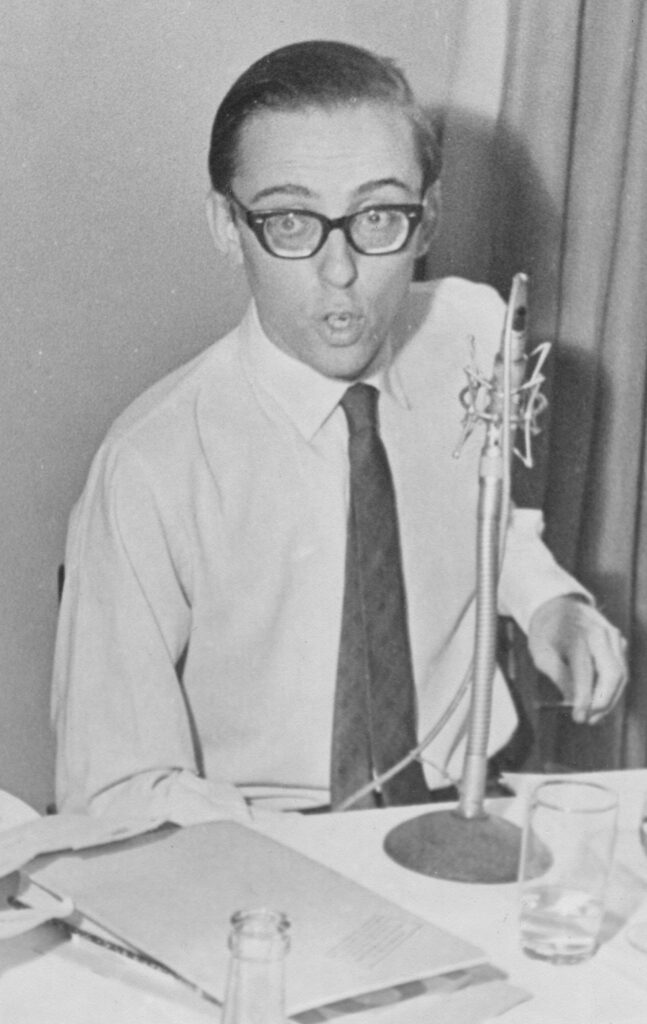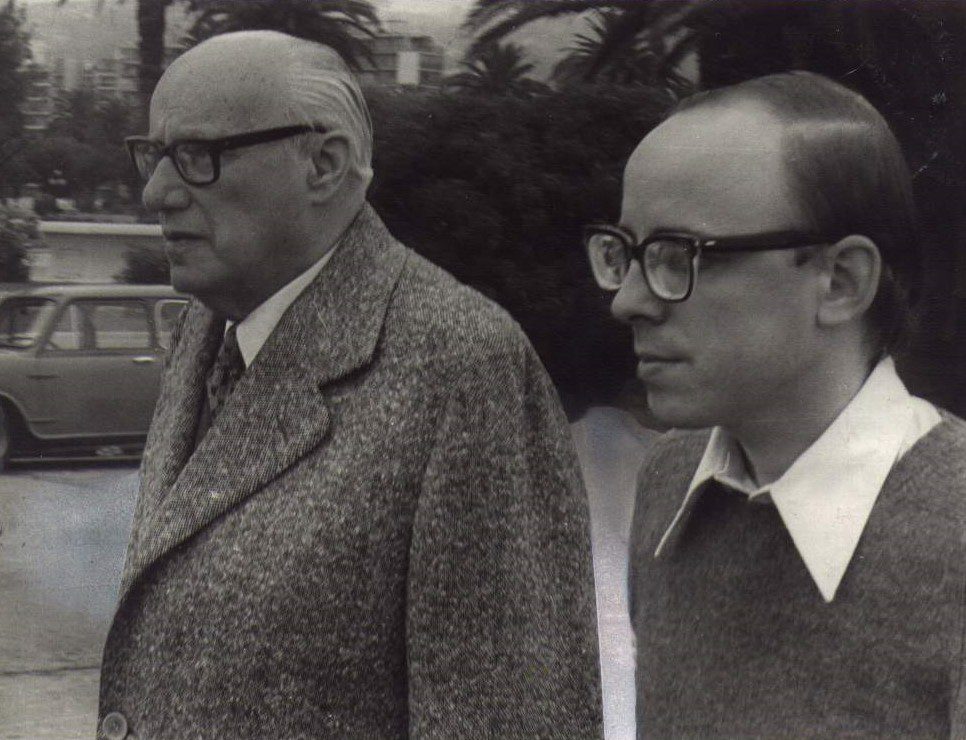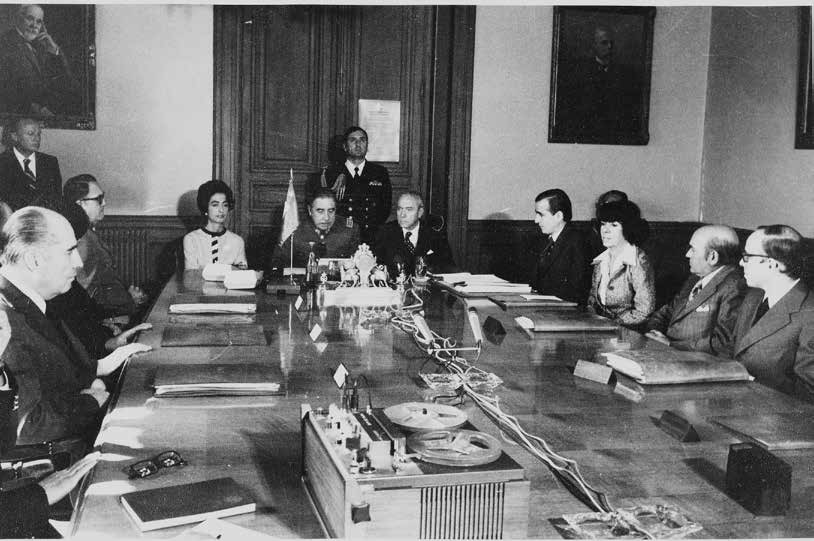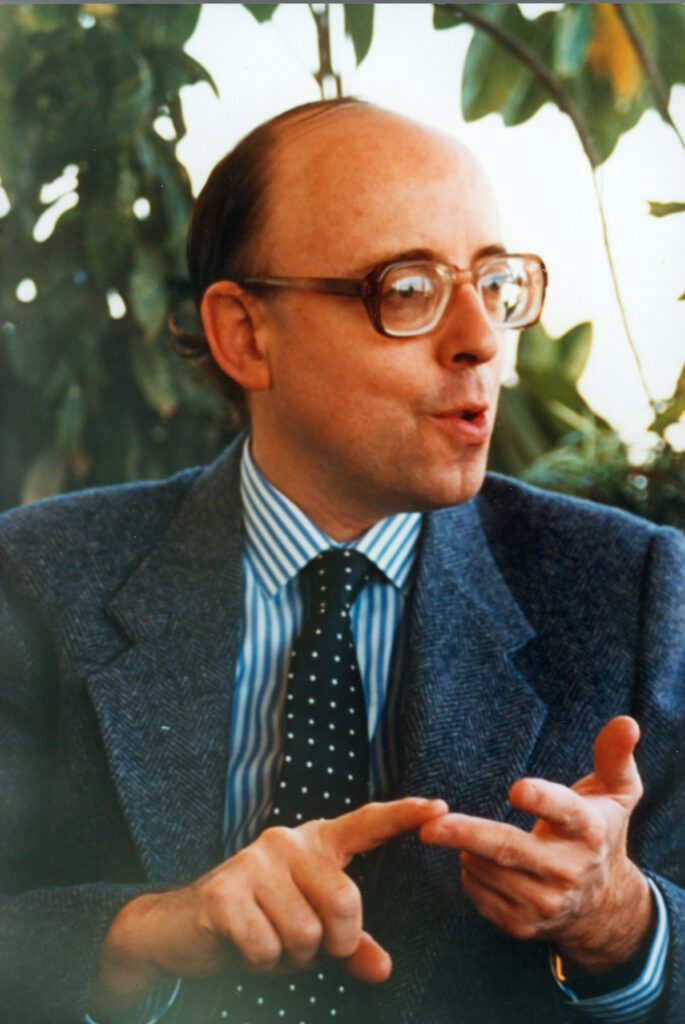
José Manuel Castro
José Manuel Castro is a researcher at the Institute of History / CEUSS Universidad San Sebastián and a Ph.D. candidate in history at University College London, UK. He is the author of Jaime Guzmán. Ideas y Política 1946-1973 and co-author of Historia de Chile, 1960-2010.
Jaime Guzmán was a Chilean politician and one of the protagonists of the great ideological struggle in Chile and Latin America that took place in the 30 years between 1960 and 1990. These were crucial decades in the history of the Cold War—a time when Latin America was regarded, by both sides in that ideological standoff, as a vital square on the global chessboard.
Let us remember that from the 1959 Cuban Revolution onwards, different strategies were being pursued by communist leaders in order to spread their agenda and expand their influence throughout what was then called ‘America’s backyard.’ In this context, Jaime Guzmán understood that marshaling a robust response to the challenge of Marxism would require more than the ‘natural’ response of most military dictatorships: namely, repression and counterinsurgency. Beyond merely reacting, Guzmán grasped the urgency of formulating a new political project that would establish the foundations of a free society—and, at the same time, protect democracy from those revolutionary elements that have so often threatened its survival in Latin America.
In this sense, it seems to me that Jaime Guzmán’s main contribution—applicable to Chile as well as to other countries in the region—was the design of a political model of “protected democracy,” the idea that democracy should be based on a series of pre-political principles that establish the legitimacy of the system. And these principles should enjoy special constitutional protection.
Guzmán’s role in drafting the new constitution during the Pinochet regime in Chile from 1973 onwards had precisely that aspiration: to set the country on the road towards a viable democratic political model that would be counter- revolutionary, immune to communist capture, and based on the recognition of certain pre-political principles such as human dignity, freedom of association, subsidiarity, private property, and free enterprise.

These concepts serve to underscore the evolution of Jaime Guzmán’s thought throughout the course of what Latin Americans often refer to as ‘the long 1960s,’ which began with Fidel Castro’s 1959 seizure of power in Cuba and ended with the overthrow of Salvador Allende’s ‘Chilean road to socialism’ in 1973. During these years, Guzmán went from supporting corporatist political projects—such as the Franco regime in Spain— to producing a new system of ideas known as gremialismo [sometimes referred to as ‘guildism’] which sought a sort of ‘liberal-conservative synthesis’ and to find common ground between democracy and the principles of Catholic social teaching.
Specifically, Catholic corporatism had criticized liberalism and Marxism for dividing society along party and class lines. As a more romantic alternative to the liberal democratic model, based on parliamentary representation through political parties, corporatists held that representation should fall directly on the ‘living forces’ of the nation. They longed for an organic democracy that would achieve a truer unity between ruler and ruled, not least by denying political parties the seemingly absurd right to act—as they can in liberal parliamentary systems—as chattering, self-regarding, and thus ultimately distorting intermediaries between the spirit of the people and the business of government.
As mentioned, in his very early period, Guzmán admired Spanish corporatist icons such as Franco and José Antonio Primo de Rivera. However, while he was a law student at the Catholic University—at the time a bastion of Chilean Catholic conservatism—Guzmán distanced himself from this tradition. He grew to believe that the organic role of intermediate bodies and the more prosaic function of party politics could complement one another—so long as parties were not carried away with their own limited political legitimacy and promised to forswear any imaginary right or intention to invade and denaturalize the wider sphere of civil society.
In the context of the hyper-politicization of all social life, once the Left was in power (led by Allende), it established a strong presence among student and trade union organizations, claiming to represent the people and the workers. Meanwhile, beyond the activity of political parties, gremialismo articulated a strong social opposition—a sort of ‘social anti-communism’—which went beyond mere reaction and sought to demonstrate the limits of the Chilean road to socialism. Hundreds of trade guilds and civil organizations demanded the protection of ‘spaces of freedom,’ which they saw as increasingly threatened by Marxism. By this point Guzmán was already calling for ‘social democracy’ based on an abiding respect for subsidiarity as well as the autonomy of social power.

Guzmán was a politician with a very solid intellectual and doctrinal formation. He was not an intellectual dedicated only to contemplation and reflection but one of those rare figures who effectively united the contemplative life with the active one, a fount of ideas as well as a man of action.
It seems to me that his main contribution was the conception and creation of gremialismo as a long-term political project. This meant respecting the complex and diverse nature of the country as a whole, and working with the organic conditions of life on the ground—as opposed to seeking to uproot them—in order to secure political stability and a more promising future for the people of Chile. This ‘historical project’ was embodied in the 1980 constitution, of which Guzmán was one of the main drafters— and which, despite numerous reforms, is still in force today. This new institutional design grew out of a critical attitude towards the statist and socialist experiences that Chile had undergone in the previous 50 years. Its main purpose was to lift the country out of the poverty, stagnation, and underdevelopment so typical of Latin American countries.
Guzmán was assassinated in 1991 by the Manuel Rodríguez Patriotic Front, the armed wing of Chilean communism. I think the deep motivation for that murder can be traced back to other earlier efforts by different sectors of the violent Chilean Left to strangle what we might call an emerging ‘Guzmánism’ while still in its cradle.
Renato Cristi and Belén Moncada have written very interesting books on Guzmán. Another important contribution is that of Daniela Carrasco and Claudio Arqueros, who recently edited the book Jaime Guzmán en Perspectiva, which gathers essays by different specialists— such as Carlos Casanova, Gonzalo Rojas, and Alejandro San Francisco.
Although there is a consensus regarding the leading role played by Guzmán in the last 50 years of Chilean history, no one should be surprised to learn that there are different evaluations of his liberal-conservative synthesis. A more critical position emphasizes, for example, the incompatible elements in his thought between the ideal of solidarity in Catholic social teaching and the premium placed on the individualistic striving that fuels capitalism. Other scholars, on the other hand, have attempted to tease out a possible confluence between both doctrines.
My research is a response to this debate. To that end, my aim is partly to identify the historical conditions that explain the emergence of Guzmán’s distinctive liberal-conservative synthesis. But more than that, I am also trying to assess whether its virtues as a political philosophy are perennial or merely particular to its own time—and therefore limited in scope. What some critics see as philosophical incompatibilities, are actually—in my research at least—a challenge of historical understanding.
I am currently embarking on two major research projects. On the one hand, I am in the final year of my Ph.D. at University College London. The subject of my research is an intellectual and political ideological history of the three Chilean revolutions between 1964 and 1980: the Christian Democratic revolution of President Eduardo Frei; the socialist revolution of Salvador Allende; and the authoritarian revolution of Augusto Pinochet. In this research, I look at Jaime Guzmán’s participation in a broader context, taking into account various different political actors and diverse ideological projects. This is a fundamental period not only in the history of Chile but also in global history. For example, a few months ago I had the opportunity to visit historical archives in Budapest to examine documents about the Cold War. I was impressed by the repercussions of Chilean news not only in Europe but particularly in the countries of the Soviet bloc.
The second major project in which I am a contributor is a history of Chile from 1960 to 2010, which is being published by the Universidad San Sebastián. It will be a 16-volume collection that explores those 50 tumultuous years from a variety of perspectives. This year alone, three new volumes will appear covering the period 1973-1980—that is, the first stage of the Pinochet regime, where Guzmán played a decisive role. Through this project we want to present an alternative to the standard, cliché- ridden, left-wing version of Chilean history that dominates the academy and, at times, even public perceptions of the past.
Once my doctoral thesis is finished and those three volumes of The History of Chile 1960-2010 are published, my plan is to finish writing the second volume on the history of Jaime Guzmán’s political ideas since 1973.
The great political figure of the Chilean right- wing in the second half of the 20th century was Jorge Alessandri, president between 1958 and 1964 and runner-up in the 1970 presidential elections, having been narrowly defeated by Salvador Allende. In fact, Jaime Guzmán was Alessandri’s political disciple. Curiously, both were very critical of the traditional Right and kept their distance from the established parties on this wing of the political spectrum.

In the intellectual sphere, four figures stood out in the second half of the 20th century: Mario Góngora, an historian of a traditionalist persuasion; Jaime Eyzaguirre, also an historian, Hispanist, a man of letters, and founder of several important cultural magazines such as Estudios and Finis Terrae; Julio Philippi Izquierdo, a lawyer and a minister during the presidency of Alessandri; and Gonzalo Vial Correa, another historian as well as a minister of education, and founding director of some very influential magazines, such as Portada and Qué Pasa.
Jaime Eyzaguirre is a fundamental figure if one wishes to grasp the meaning of conservatism in Chile. Both Gonzalo Vial and Jaime Guzmán were his disciples. All of the above-mentioned names, moreover, studied at the law school of the Catholic University of Chile.
Although Chilean conservatives often staked a claim to their greater Hispanic heritage, it is curious that they remained more focused on political and intellectual disputes internal to Chile than on the formation of a larger continental or transatlantic ‘Iberian’ project. The magazines founded by figures like Eyzaguirre and Gonzalo Vial certainly forged connections with other countries in the Hispanosphere; still, the national interest predominated. In that sense, Chile is a secondary actor when compared to Argentina, Colombia, or Mexico.
Carl Schmitt’s influence on Guzmán is rather secondary and his impact has been overstated. It seems to me that one of the key intellectual figures for Guzmán—and curiously also for Schmitt— is the Spanish politician Juan Donoso Cortés. Guzmán could recite by heart some of Donoso Cortés’ speeches. There is no doubt that the legitimization of the coup d’état in Chile on September 11, 1973—and of the dictatorship that followed—was influenced by Donoso Cortés’ idea that “the dictatorship of the sword is preferable to the dictatorship of the dagger,” a line that appears in one of his speeches. In addition, the corporatist project and the experience of the Spanish Civil War were key for Guzmán in his early period.
Another key component—probably the most important—was his familiarity with Catholic doctrine. Guzmán read St. Thomas Aquinas from an early age and throughout his life studied papal encyclicals on the social teachings of the Church. He knew very well the magisterium of John XXIII, Paul VI, and especially John Paul II. Partly thanks to this, he viewed the threat of atheistic communism through a scholarly Catholic lens. In that sense, I think his readings of Miguel Poradowski, a Polish priest who lived in Chile for several decades and who fought against the penetration of Marxism in the Church, were crucial. He was also very impressed by the example of Cardinal Mindszenty in Hungary, who, according to Guzmán, displayed the “dramatic testimony of a living martyrdom.”

They have an impressive collection of approximately 15,000 documents, including letters, speeches, press clippings, and reports. (This does not include Guzmán’s own library, which contains more than 1,200 books.) And most of these can be consulted online through the foundation’s website.

If we want to understand Guzmán’s political and intellectual leadership, there are three types of important documents at the Jaime Guzmán Foundation. First, there are many important letters written to Guzmán by television viewers in the 1970s, when he was a panelist on what was then the most important political debate program in the country: “A esta hora se improvisa” (At this time, we improvise), broadcast on Channel 13. His appearances on that program catapulted Guzmán to national prominence and earned him thousands of followers—all of which was key to the formation of an organized and intellectually informed anticommunist movement across Chile. Then there are the many speeches Guzmán wrote for important political figures. And finally, there are the political memoranda prepared by Guzmán for the military junta. One example is the memorandum he wrote when, in the immediate aftermath of the 1973 coup, the military junta needed to determine what kind of government they would establish—and for how long. Instead of the suggestion made by some in the corridors of power that a short dictatorship should cede power to civilians as soon as possible, Guzmán argued convincingly that a longer dictatorship would provide the necessary time in which to enact important fundamental changes. According to his view, these were necessary in order to establish a new—and ultimately sustainable—political order in the country.
Although it is not an element that appears explicitly, the idea of Hispanidad was at the centre of Jaime Guzmán’s political thought. That notion was an inheritance from his teacher, the historian Jaime Eyzaguirre, who taught his students a profound understanding of the identity of Hispanic America and its place in the world. Guzmán emphasized that the idea of Hispanidad made it possible to understand ‘the soul of Chile’ through the knowledge of its own tradition, whose origin was Spain. Obviously, it was not only about Chile. For Guzmán, the main value of Hispanidad was that it secured the entry of the entire American continent—as sister nations—into Western and Christian civilization.
Guzmán was certainly a key architect of the new political order and the 1980 constitution. It is because of him that, for the first time in the history of Chile, ideas such as human dignity, protection of the unborn, subsidiarity, free enterprise, protection of private property, and limited government all gain importance. Thanks to Guzmán, the principle of subsidiarity—present in Chilean theoretical debates at the time—became the practical cornerstone of a new political and social order. For Guzmán, the 1980 constitution was the fundamental instrument that would make it possible to ‘consecrate’ Chile’s historic project and protect its achievements against ideological subversion. The constitutional recognition of fundamental values and the expansion of the exercise of political, economic, and social freedoms by the broadest sectors of the citizenry were the key to lifting Chile out of the mire of chaos, poverty, and underdevelopment—and setting it on a path to progress.
This essay appears in the Fall 2023 edition of The European Conservative, Number 28:34-39.
